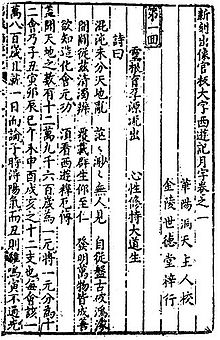Journey to the West

Earliest known edition of the book from the 16th century
|
|
| Author | Wu Cheng'en |
|---|---|
| Original title | |
| Country | Ming dynasty China |
| Language | Chinese |
| Genre | Gods and demons fiction, Chinese mythology, fantasy, adventure |
|
Publication date
|
c. 1592 (print) |
| Media type | |
| ISBN | |
| Journey to the West | |||||||||||||||||||||||||

"Journey to the West" in Traditional (top) and Simplified (bottom) Chinese characters
|
|||||||||||||||||||||||||
| Traditional Chinese | 西遊記 | ||||||||||||||||||||||||
|---|---|---|---|---|---|---|---|---|---|---|---|---|---|---|---|---|---|---|---|---|---|---|---|---|---|
| Simplified Chinese | 西游记 | ||||||||||||||||||||||||
|
|||||||||||||||||||||||||
| Transcriptions | |
|---|---|
| Standard Mandarin | |
| Hanyu Pinyin | Xī yóu jì |
| Wade–Giles | Hsi1-yu2 chi4 |
| IPA | [ɕí jǒu tɕî] |
| Wu | |
| Suzhounese | Si yøʏ dzǐ |
| Yue: Cantonese | |
| Yale Romanization | Sāi yàuh gei |
| Jyutping | Sai1 jau4 gei3 |
| Southern Min | |
| Tâi-lô | Se iû kì (col.) Sai iû kì (lit.) |
Journey to the West is a Chinese novel published in the 16th century during the Ming dynasty and attributed to Wu Cheng'en. It is one of the Four Great Classical Novels of Chinese literature. In English-speaking countries, the work is widely known as Monkey, the title of Arthur Waley's popular abridged translation.
The novel is an extended account of the legendary pilgrimage of the Tang dynasty Buddhist monk Xuanzang who traveled to the "Western Regions", that is, Central Asia and India, to obtain Buddhist sacred texts (sūtras) and returned after many trials and much suffering. It retains the broad outline of Xuanzang's own account, Great Tang Records on the Western Regions, but the Ming dynasty novel adds elements from folk tales and the author's invention, that is, that Gautama Buddha gave this task to the monk and provided him with three protectors who agree to help him as an atonement for their sins. These disciples are Sun Wukong, Zhu Bajie and Sha Wujing, together with a dragon prince who acts as Xuanzang's steed, a white horse.
Journey to the West has strong roots in Chinese folk religion, Chinese mythology, Taoist and Buddhist philosophy, and the pantheon of Taoist immortals and Buddhist bodhisattvas are still reflective of some Chinese religious attitudes today. Enduringly popular, the tale is at once a comic adventure story, a humorous satire of Chinese bureaucracy, a spring of spiritual insight, and an extended allegory in which the group of pilgrims journeys towards enlightenment by the power and virtue of cooperation.
...
Wikipedia
